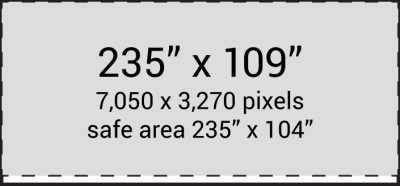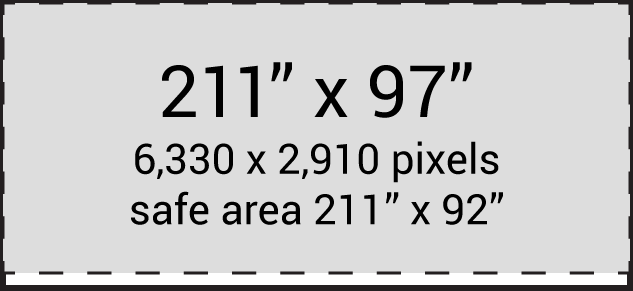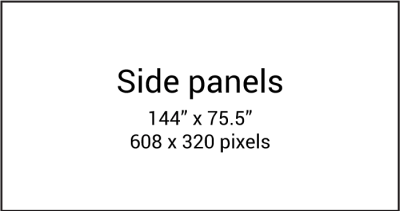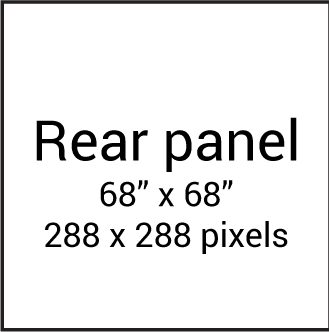Mobile billboard banner specifications, artwork requirements, and design tips
Printed banners
Banner Size
We use two differently sized trucks with the following banner dimensions:


The image size of the banners required for our mobile billboards is 235″ wide by 109″ tall, or 211″ wide by 97″ tall. The image can bleed off the edge, but it is recommended that you keep critical text at least five inches from the bottom edge unless the design is intentional.
Image Resolution
Given the size and typical viewing distance of our trucks, 30 pixels per inch is a good compromise between file size and image quality. For a full size, banner-filling image, this translates to 7,050 x 3,270 pixels for our larger size trucks, 6,330 x 2,910 for the smaller.
Attribution
The owner or sponsor of a campaign must be clearly indicated in ad copy.
Reference Image
If your art is not already in PDF or JPEG format, please provide one of these as a visual check to ensure your art is reproduced properly.
Delivery
Depending on file size, you may deliver your art to us via email or your cloud storage of choice – Dropbox, Hightail, Google Drive, OneDrive, etc. Please do not send files larger than 10MB via email – it is very possible your message will be lost or blocked en route to us.
Proofing
We will provide a PDF color proof of your mobile billboard ad via email. You will be asked to approve the proof via email.
Turnaround
The optimum production time is 10-15 business days (Monday through Friday with holidays subtracted). A color proof will be provided in 2-3 business days and should be approved in writing in 1-2 business day(s). Production & ground shipping takes 6-9 business days, and installation takes 1-2 business days. This schedule begins once we receive properly formatted artwork along with the production deposit. Please contact us as soon as possible if these constraints cause a problem.
Digital screens
Display Sizes


These pixel numbers work well given the typical viewing distance we encounter. This resolution does introduce some limitations, however.
Typography
For proper rendering, we recommend bold type be at least 8px in size, 10px better. For normal weight type, 10px minimum, 12px better. For light weights, 12px minimum, 15px better. You can of course go as large as the design calls for – these are minimums.
QR Codes
To function properly, QR codes must be sized to at least 150px; 200px will allow them to function under more conditions.
Attribution
The owner or sponsor of a campaign must be clearly indicated in ad copy.
File formats and delivery
Still images can be sent as high quality, RGB JPG format. Videos must be in MP4, H.264 format. Files less than 10MB can be delivered via email; for larger files please use Dropbox. Maximum size of all files must be less than 1GB.
Turnaround
Digital campaigns can be launched in as little as an hour, assuming truck availability. This of course does not include design, approvals, etc.
Design tips
Timeline
Make sure there’s enough time! See our Turnaround topic above, then add whatever time concept and design will take.
Simple and bold
You have seconds to communicate your message so try to boil your message down to its very essence. Large, simple, clear text, bold imagery, and sufficient contrast can help you. Letter height of 6″ or more is a good starting point.
Color limitations for digital LED billboards
Large areas of white (RGB 255/255/255) can overload the LED system and result in areas of dropped pixels. Please substitute off-white if this is part of your design. Similarly, large areas of black can appear washed-out under bright sun; dark gray can be substituted in this case.
Prominent calls to action
Calls to action such as phone numbers, web addresses, etc. are best situated in the top half of the design, so as to not be blocked by passing traffic or other people.
Don’t forget branding
If you’re including your logo, make sure it’s big enough to be legible from a distance.
More information
The Outdoor Advertising Association of America (OAAA) produced a great primer on this topic in 2009 – but most of it is just as relevant today.